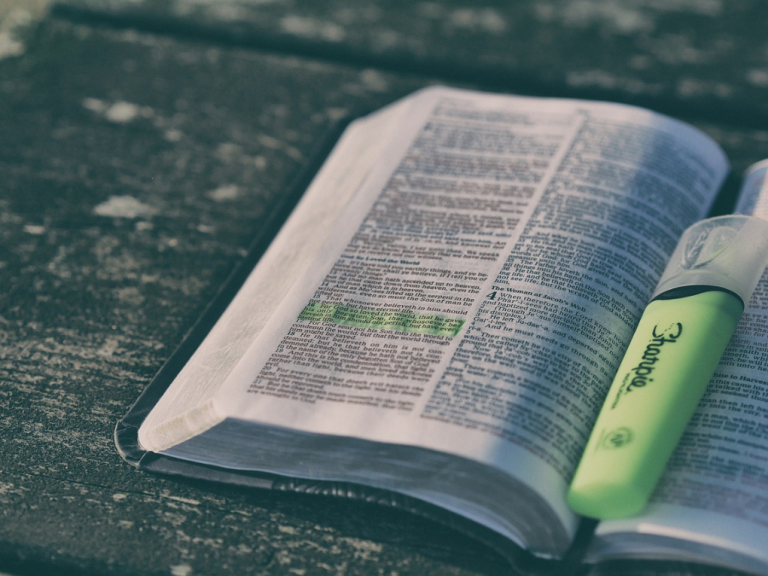1 Why standest thou afar off, O LORD? why hidest thou thyself in times of trouble?
2 The wicked in his pride doth persecute the poor: let them be taken in the devices that they have imagined.
3 For the wicked boasteth of his heart’s desire, and blesseth the covetous, whom the LORD abhorreth.
4 The wicked, through the pride of his countenance, will not seek after God: God is not in all his thoughts.
5 His ways are always grievous; thy judgments are far above out of his sight: as for all his enemies, he puffeth at them.
6 He hath said in his heart, I shall not be moved: for I shall never be in adversity.
7 His mouth is full of cursing and deceit and fraud: under his tongue is mischief and vanity.
8 He sitteth in the lurking places of the villages: in the secret places doth he murder the innocent: his eyes are privily set against the poor.
9 He lieth in wait secretly as a lion in his den: he lieth in wait to catch the poor: he doth catch the poor, when he draweth him into his net.
10 He croucheth, and humbleth himself, that the poor may fall by his strong ones.
11 He hath said in his heart, God hath forgotten: he hideth his face; he will never see it .
12 Arise, O LORD; O God, lift up thine hand: forget not the humble.
13 Wherefore doth the wicked contemn God? he hath said in his heart, Thou wilt not require it .
14 Thou hast seen it; for thou beholdest mischief and spite, to requite it with thy hand: the poor committeth himself unto thee; thou art the helper of the fatherless.
15 Break thou the arm of the wicked and the evil man: seek out his wickedness till thou find none.
16 The LORD is King for ever and ever: the heathen are perished out of his land.
17 LORD, thou hast heard the desire of the humble: thou wilt prepare their heart, thou wilt cause thine ear to hear:
18 To judge the fatherless and the oppressed, that the man of the earth may no more oppress.
ǂHanu-aisib di ǀgores
1 ǃKhūtse, tare xū-i ǃaromats kha ǃnūse mâ?
Tare-i ǃaromats ǂōǂōsib ǁaeb ǃnâ ra gaugausen?
2 ǁÎn ǂnīsasib ǃnân ge ǂkhabadī-aona ǀgâsana ra ǃgôaǃgon
an ǁîn ǂûn ǂnûi hâ ǃnuidi xa ǃkhōhe.
3 ǂKhabadī-aon ge ǁîn di ǂkhaba turagu ǀkha ra koasen.
Xūǃgunuxan ge ǀâxareba ǃkhōǃoa tsî ǃKhūba ra ǃharaxū.
4 ǂKhabadī-aon ge ǁîn ǀgapiǂâixasib ǃnâ nēti ra ǂâi:
“Elob ge ǃeream-e ǂgaoǀkhā te tide.”
ǁÎn di ǂâidi ǃnâb ge Eloba a ǀkhai.
5 ǁÎn ge ǂâibasenn ra xūn hoan ǃnâ ra ǃgâiǃgâ,
sa ǀgoraǃgâdi ge ǁîna xu kaise a ǃnū.
ǃGôaǁnâs asen ge khākhoen ân ai ra ǂara.
6 ǂGaogu ân ǃnân ge ra mî:
“Tātsēs tsîna da ge tsūǃgâ-i ǃnâ ǂgâ tide.”
7 Ams â-i ge ǀâxareb tsî ǂhumib xa ǀoa hâ,
nams â-i ǃnaka ǂkhabasib tsî ǁgauoǃnâsib tsîkha.
8 ǀHôagaosen huio khoen ǃaroma ǃnuide ǃārodi ǃnâ ra ǁgui;
tsî ǂganǃgâsa ǃkhaidi ai ǀhapio khoena ra ǃgam
tsî di ge mûdi âna ǀkhomǀkhomsana ra ǃkhē.
9 Gauǃkhais ân ǃnân ge xam-i khami
ǀgâsan di ǃkharusa ǃâuǁgoe
tsî ǁîna ǃnuis ân ǃnâ ǃkhō tsî ra ǃkharabē.
10 Tsî i ge nē huio khoe-e ǂkhū tsî ra ǁnā
nē ǀgaiǀkhā-i xa danhe tsî.
11 ǂKhabadī-aon ge ǂgaogu ân ǃnâ
“Elob ge ǀuru hâ, tsî ais âba gaugau hâ,
tsî ǁkhawa mû tide” ti ra ǂâi.
12 Khâi re ǃKhūtse! Nē ǂkhabadī-aona ǁkhara re!
Îts ǁgâiǀāhe hâna tā ǀuru.
13 Mâtin kha ǂkhabadī-aona Eloba mîǁnâ tsî
“ǁÎb ge ǁkhara te tide” ti ǂgaogu ân ǃnâ ra mî?
14 Xawets ge satsa ǂōǂōsib tsî ǃoab tsîkha ra mû,
tsîts ge ǁîkha ra dībē.
Huio khoen ra sats ai mûmâinǃgâ,
tsîts ǃguniǀgôana ǁgûse ība.
15 Khôaǃā re ǁnā ǂkhabadī-aon di ǀgaiba,
î tsūdīb ân ai ǁîna ǁkhara re,
ôats ka xawets ǁkhawa hō tides kōse.
16 ǃKhūb ge ǀamose a gao-ao.
ǀŪben ge ǃhūbaiba xu nî kā.
17 ǃKhūtse, ǃgamǃgamsensan di ǀgoresa ǁnâu
tsîts ge ǁîna nî ǀgaiǀgai.
18 ǁGâiǀāhe hân tsî ǃguniǀgôan di āsa ǁnâu
tsîts ge ǁîn ǃgâib ǃoa nî ǀgoraǃgâ,
îb ǁō ǁkhā khoesiba tā ǃaruǀî ǁîna ǃaoǃao.


